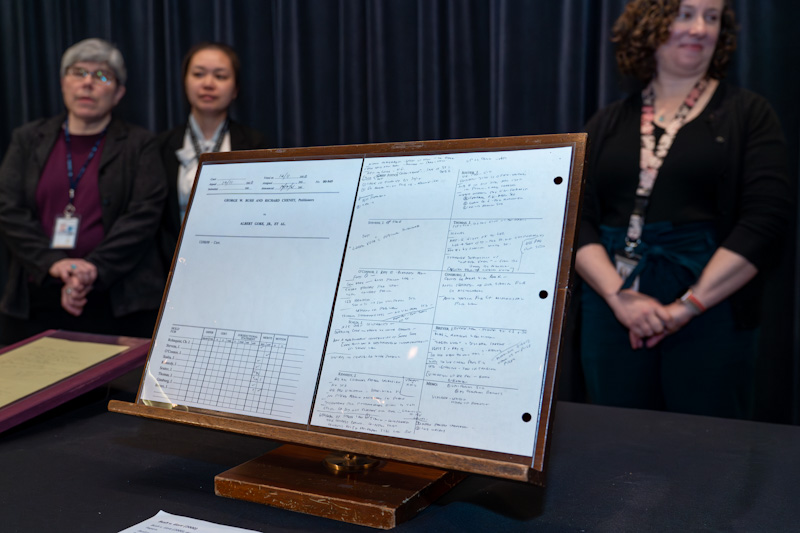Rehnquist dropped push for 'independent state legislature' theory in Bush v. Gore, Stevens' papers show

Papers of the late U.S. Supreme Court Justice John Paul Stevens are displayed, including his notes during Bush v. Gore, which were made available to researchers at the Library of Congress in Washington, D.C., on May 1. Photo by J. Scott Applewhite/The Associated Press.
Newly released private papers of then-Justice John Paul Stevens provide insight into U.S. Supreme Court deliberations and concerns before its decisions that decided a presidential election and affirmed the right to abortion.
The papers reveal “the strong hand” of then-Justice Sandra Day O’Connor in crafting the 2000 Bush v. Gore decision, decided by a 5-4 vote, CNN reports.
And they show then-Chief Justice William H. Rehnquist’s concern about a leak before the release of the 1992 decision affirming the right to abortion in Planned Parenthood v. Casey, according to the New York Times.
Those cases are discussed in the second batch of the late justice’s papers, which are now available at the Library of Congress.
“The papers are studded with candid and occasionally caustic remarks, sometimes echoing current concerns about the court’s power and authority,” according to the New York Times.
The papers cover cases decided through the middle of 2005, the Associated Press reports. A third batch of papers will be released in 2030.
According to CNN, O’Connor had circulated a memo to colleagues in advance of oral arguments in the 2000 election case. At issue was whether vote recounts should be stopped in Florida, which would hand the election to former President George W. Bush.
O’Connor’s memo “laid the groundwork” for the Supreme Court’s majority opinion that said there were no precise standards being applied to recounts in Florida counties, which violated the equal protection clause, according to CNN.
O’Connor had complained that the Florida Supreme Court failed to provide a “uniform, statewide method” for the recount, leaving the counties free to devise standards.
Then-Justice Anthony Kennedy had responded that O’Connor’s memo set out “a very sound approach,” and he hoped to build on it. Their partnership in the case effectively blocked the views of Rehnquist, who advanced the “independent state legislature” theory, according to CNN.
The theory, at issue in a current pending case before the Supreme Court, argues that the U.S. Constitution’s elections clause bans state courts from using state constitutions to review electoral practices set by state legislatures.
In the abortion case, an apparent leak caused Rehnquist to scold and warn law clerks, according to the New York Times. Rehnquist noted a Newsweek report predicting that the decision would be released June 29, 1992, and said at least three justices were planning to write opinions in the case.
“There should be as little communication as possible between the clerk and representatives of the press,” Rehnquist said. “In the case of any matter pending before the court, the least possible communication is none at all.”



